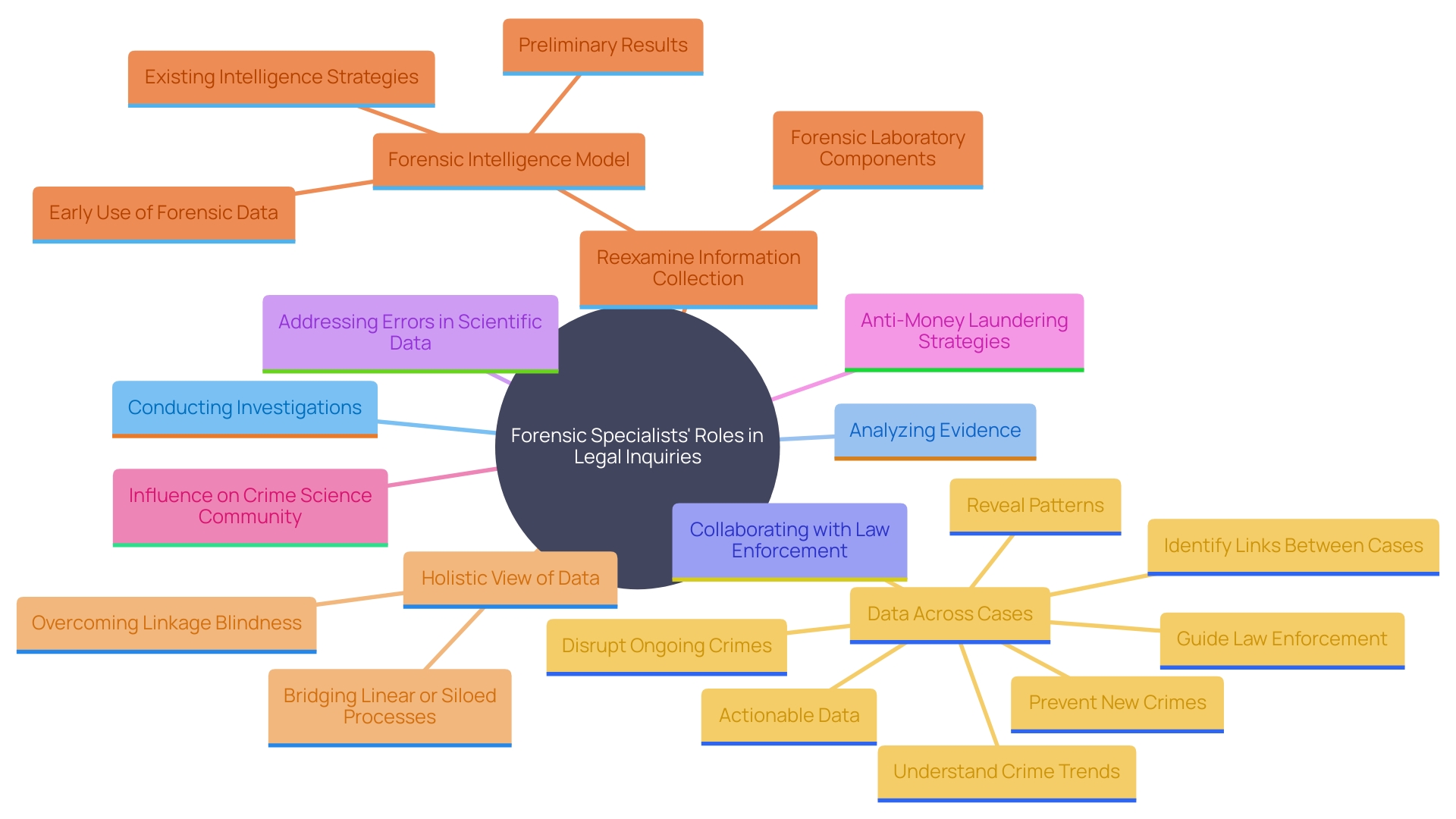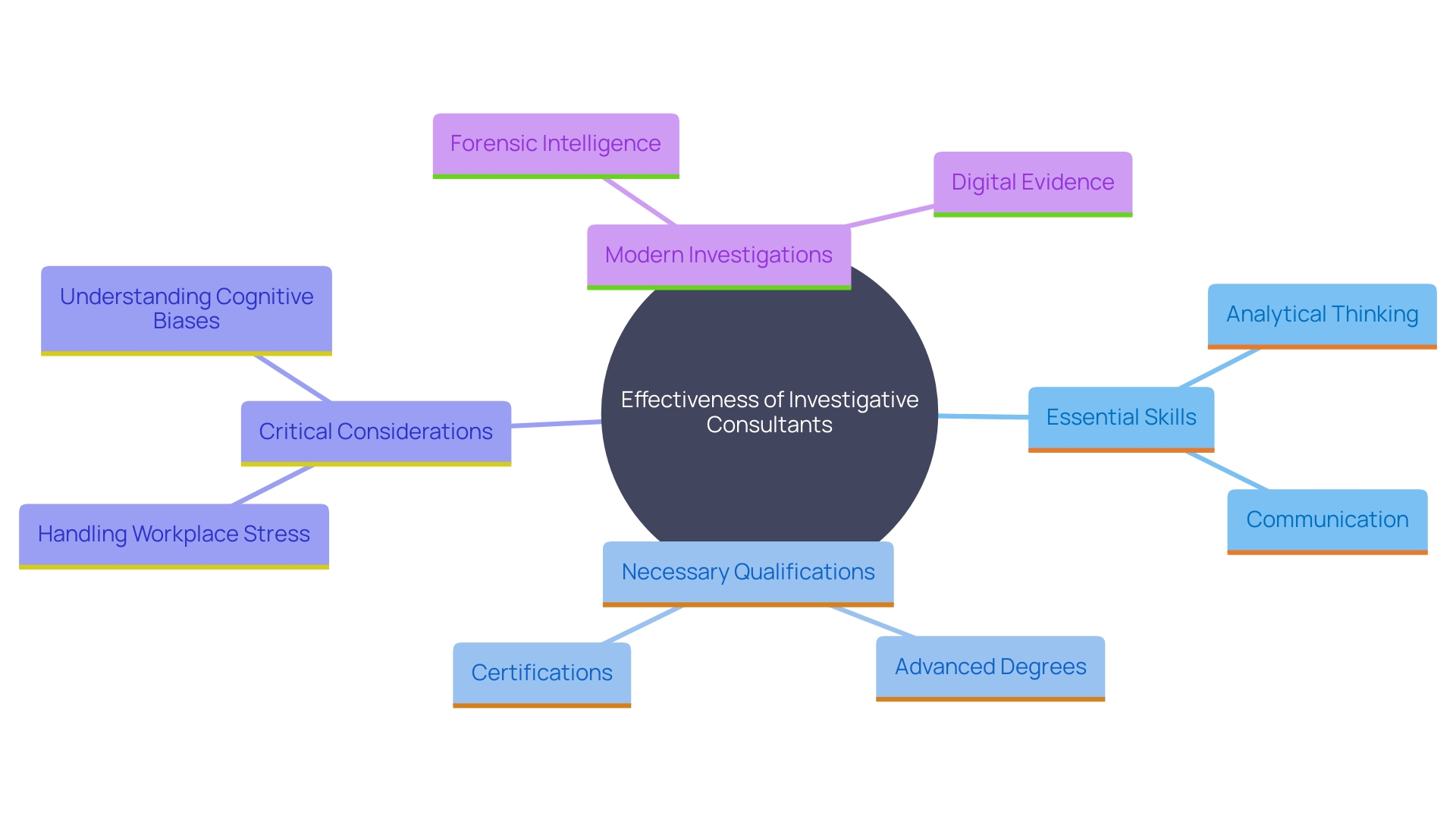Introduction
Forensic consultants play a pivotal role in the legal landscape, bridging the gap between complex evidence and judicial clarity. Their expertise spans comprehensive investigations, meticulous evidence analysis, and expert testimony, which can decisively influence case outcomes. Forensic consultants collaborate with law enforcement, legal teams, and corporations to unearth financial irregularities, fraud, or misconduct, with an astounding 84% of cases relying on their testimony.
They ensure the reliability of scientific evidence presented in court and address errors linked to unqualified examiners. Additionally, they are key in developing anti-money laundering strategies and leveraging innovative technologies to enhance investigative efficiency. By addressing cognitive biases and improving validation studies, forensic consultants accelerate case resolutions and guide law enforcement towards meaningful leads, making forensic evidence a formidable tool in the pursuit of justice.
Key Responsibilities of a Forensic Consultant
Forensic specialists are crucial in legal inquiries, providing expert evaluation and testimony that can greatly influence the results of trials. Their responsibilities encompass conducting comprehensive investigations, analyzing complex evidence, and preparing meticulous reports. Collaborating with law enforcement agencies, legal teams, and corporations, they work to uncover financial irregularities, fraud, or misconduct. A significant 84% of instances depend on specialist testimony, highlighting the importance of expert advisors in the legal process.
In cases requiring specialized knowledge, forensic consultants facilitate the identification of experts with the necessary expertise and experience. They play a critical role in ensuring that scientific data presented in court is reliable and accurately interpreted. This includes addressing common errors such as inadequate defense and failure to recognize exculpatory evidence, which are often linked to fraud or uncertified examiners.
Moreover, investigative experts play a crucial role in creating and executing anti-money laundering (AML) strategies. They provide litigation support and offer expert opinions in court, often utilizing innovative technologies to streamline investigations. For instance, automated technology workflows can reduce the time and cost of digital IP theft investigations by up to 90%, significantly enhancing efficiency and accuracy.
Specialized advisors also aid in the progress of investigative science by tackling cognitive biases and enhancing validation studies. By utilizing investigative insights early in inquiries, they can speed up resolution and recognize crime patterns. This proactive approach guides law enforcement towards meaningful leads, avoiding dead ends.
The influence of investigative specialists reaches further than single instances, as they assist in molding the wider crime science community. By adopting best practices and continuously enhancing approaches, they ensure that investigative material remains a powerful tool in the pursuit of justice.

Types of Forensic Consultants
Forensic consulting spans a diverse array of specialties, each catering to specific investigative needs. Financial investigative consultants play a critical role in dissecting complex financial crimes and fraud, leveraging their expertise to uncover hidden irregularities. In a notable instance, Arthur, an internal auditor, was tasked with implementing a data analysis program at Oak Company to detect potential fraud indicators, highlighting the crucial steps in using data analysis effectively.
Forensic accountants further delve into financial records, identifying inconsistencies that could indicate fraudulent activities. Their work is underscored by findings from the 13th edition of the Occupational Fraud Report, which revealed that tips are the most common method of detecting occupational fraud, surpassing other techniques.
Digital investigative specialists, essential in today's technology-focused society, carefully analyze electronic information for proof. A case in point is Nobles, a digital investigator who conducted a criminal inquiry into Lucas, a construction company executive, for alleged bribery. 'Nobles' ability to obtain a court order to seize Lucas' personal computer for examination exemplifies the thorough processes involved.'.
Moreover, criminal psychologists offer invaluable insights by evaluating behavioral patterns, which can be crucial in comprehending the motivations behind deceptive activities. "Dr. David P. Weber, a renowned financial investigator and Certified Fraud Examiner, has been recognized for his exemplary dedication to fraud prevention and investigation, illustrating the impact of behavioral analysis in investigative science.".
Forensic engineers, on the other hand, focus on investigating structural failures or accidents, offering critical insights relevant to legal cases. Their role is vital in ensuring that engineering principles are applied to uncover the root causes of such incidents, thereby supporting litigation and risk management efforts.
This multifaceted approach to investigative consulting not only enhances the accuracy of inquiries but also ensures that organizations can mitigate risks and maintain compliance with regulatory standards. By utilizing the knowledge of specialized investigative experts, businesses can effectively navigate the complexities of financial crimes, fraud, and other challenges in inquiry.
Skills and Qualifications
An effective investigative consultant must possess a blend of analytical thinking, meticulous attention to detail, and strong communication skills. Necessary qualifications comprise advanced degrees in areas like accounting, law, or criminal justice, along with certifications in investigative analysis or fraud examination. Experience in investigative work and a deep understanding of legal procedures are paramount. Skill in utilizing investigative software tools is essential for managing intricate matters effectively. Furthermore, handling workplace stress and comprehending cognitive biases are essential for making precise decisions, as these elements can greatly affect investigative results. The integration of forensic intelligence early in investigations can accelerate resolution and help identify crime trends, making data actionable swiftly to guide law enforcement effectively. Moreover, with the increasing prevalence of digital evidence in criminal and civil cases, understanding its nuances and limitations is indispensable for specialists and legal professionals.

Challenges and Best Practices in Forensic Testimony
Forensic consultants often encounter significant hurdles when presenting their findings in court. Simplifying complex technical information for juries and addressing opposing expert testimonies are common challenges. Effective preparation involves crafting clear, concise reports and honing communication strategies. It's essential to build credibility through continuous professional development and adherence to ethical standards, ensuring resilience during cross-examination and maintaining the integrity of findings.
The National Institute of Standards and Technology (NIST) has been crucial in advancing crime scene investigation practices. Their efforts aim to remove bias in measurements, analysis, and interpretation of data, thereby enhancing the reliability and validity of investigative methods. NIST's Forensic Science Program has outlined 'grand challenges' such as enhancing the precision and dependability of analysis, which directly affects the credibility of specialists in court.
Experts like NIST Director Laurie Locascio emphasize the importance of strengthening the scientific foundations of investigative methods. This involves developing new techniques for analyzing complex evidence and promoting the adoption of science-based standards. These advancements are essential for investigative experts, ensuring their methodologies endure examination in legal proceedings.
The use of statistical and algorithmic techniques is becoming increasingly important in criminal investigation science. For example, the analysis of questioned handwritten documents and firearm marks involves both traditional statistical modeling and algorithmic approaches to determine common sources. These techniques are not only improving the precision of investigative evaluations but also equipping advisors for the stringent requirements of courtroom testimony.
Expert witnesses are expected to provide impartial opinions based on reliable principles and sufficient data. Under Federal Rule of Evidence 702, their testimony must help the trier of fact understand the evidence. Therefore, investigative consultants must be thoroughly vetted and well-prepared, as failure to properly investigate an expert's background can lead to professional liability.
'The scientific community continues to address issues such as the treatment of inconclusive decisions in feature comparison disciplines.'. Differentiating between 'method conformance' and 'method performance' is essential for assessing the reliability of investigative techniques. By adhering to these rigorous standards, forensic consultants can ensure their findings are robust and credible in the eyes of the court.
Conclusion
Forensic consultants play an indispensable role in the legal system, providing critical analysis and expert testimony that can dramatically influence case outcomes. Their multifaceted responsibilities include conducting thorough investigations, analyzing complex evidence, and ensuring the reliability of scientific data presented in court. By collaborating closely with law enforcement and legal teams, they uncover financial irregularities and misconduct, significantly enhancing the integrity of judicial processes.
The diverse specializations within forensic consulting, from financial forensics to digital evidence analysis, highlight the necessity of tailored expertise in addressing specific investigative challenges. Each type of forensic consultant brings unique skills to the table, ensuring that organizations can effectively navigate the complexities of financial crimes and fraud. This multifaceted approach not only promotes accurate investigations but also aids businesses in mitigating risks and maintaining compliance with regulatory standards.
Despite the significant contributions of forensic consultants, challenges remain, particularly in presenting findings in court. Simplifying complex information for juries and countering opposing expert testimonies require meticulous preparation and clear communication. By adhering to best practices and continuously improving methodologies, forensic consultants can enhance their credibility and ensure that their findings withstand scrutiny in legal proceedings.
In summary, the role of forensic consultants is vital in the pursuit of justice. Their expertise not only shapes individual cases but also contributes to the broader forensic science community. By investing in continuous professional development and leveraging innovative technologies, forensic consultants can further refine their methodologies, ultimately reinforcing the reliability of forensic evidence in the judicial process.




